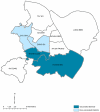Use of oral cholera vaccines in an outbreak in Vietnam: a case control study
- PMID: 21283616
- PMCID: PMC3026769
- DOI: 10.1371/journal.pntd.0001006
Use of oral cholera vaccines in an outbreak in Vietnam: a case control study
Abstract
Background: Killed oral cholera vaccines (OCVs) are available but not used routinely for cholera control except in Vietnam, which produces its own vaccine. In 2007-2008, unprecedented cholera outbreaks occurred in the capital, Hanoi, prompting immunization in two districts. In an outbreak investigation, we assessed the effectiveness of killed OCV use after a cholera outbreak began.
Methodology/principal findings: From 16 to 28 January 2008, vaccination campaigns with the Vietnamese killed OCV were held in two districts of Hanoi. No cholera cases were detected from 5 February to 4 March 2008, after which cases were again identified. Beginning 8 April 2008, residents of four districts of Hanoi admitted to one of five hospitals for acute diarrhea with onset after 5 March 2008 were recruited for a matched, hospital-based, case-control outbreak investigation. Cases were matched by hospital, admission date, district, gender, and age to controls admitted for non-diarrheal conditions. Subjects from the two vaccinated districts were evaluated to determine vaccine effectiveness. 54 case-control pairs from the vaccinated districts were included in the analysis. There were 8 (15%) and 16 (30%) vaccine recipients among cases and controls, respectively. The vaccine was 76% protective against cholera in this setting (95% CI 5% to 94%, P = 0.042) after adjusting for intake of dog meat or raw vegetables and not drinking boiled or bottled water most of the time.
Conclusions/significance: This is the first study to explore the effectiveness of the reactive use of killed OCVs during a cholera outbreak. Our findings suggest that killed OCVs may have a role in controlling cholera outbreaks.
Conflict of interest statement
The authors have declared that no competing interests exist.
Figures




References
-
- WHO. Cholera: global surveillance summary. Wkly Epidemiol Rec. 2009;84:309–24. - PubMed
-
- WHO. Cholera vaccines. Wkly Epidemiol Rec. 2001;76:117–24. - PubMed
-
- WHO. Cholera vaccines. Wkly Epidemiol Rec. 2010;85:117–28. - PubMed
-
- Calain P, Chaine JP, Johnson E, Hawley ML, O'Leary MJ, et al. Can oral cholera vaccination play a role in controlling a cholera outbreak? Vaccine. 2004;22:2444–51. - PubMed
-
- Richie EE, Punjabi NH, Sidharta YY, Peetosutan KK, Sukandar MM, et al. Efficacy trial of single-dose live oral cholera vaccine CVD 103-HgR in North Jakarta, Indonesia, a cholera-endemic area. Vaccine. 2000;18:2399–410. - PubMed
Publication types
MeSH terms
Substances
LinkOut - more resources
Full Text Sources
Medical
Miscellaneous

